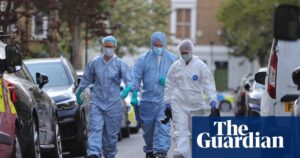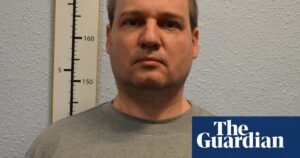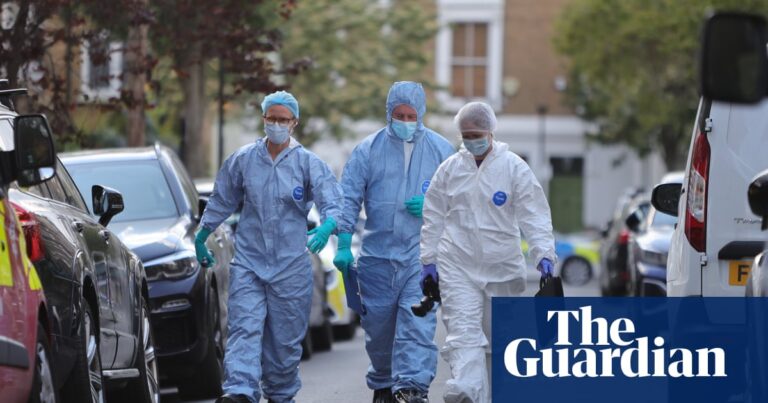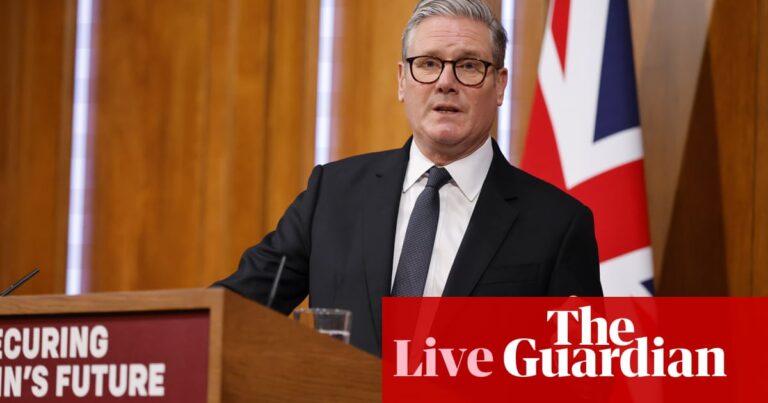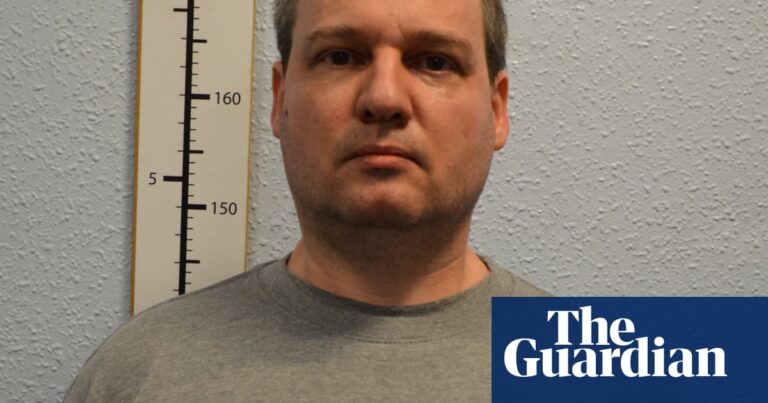Haiti has announced a state of emergency lasting three days and a curfew during night hours. This decision was made after armed gangs raided the country’s two largest prisons, resulting in over 3,000 high-risk inmates, such as murderers and kidnappers, being released onto the already impoverished and tumultuous streets of the Caribbean nation.
The finance minister, Patrick Boisvert, who currently holds authority while the embattled prime minister, Ariel Henry, is away attempting to gain support for a UN-supported security force to bring stability to Haiti, announced that the police will utilize all legal methods to recapture the escaped prisoners and enforce the curfew.
Jimmy Chérizier, a former member of the police force and leader of a gang federation, has taken credit for the recent increase in violent attacks. He stated that the purpose of these attacks is to capture the head of the Haitian police force and government officials, in order to prevent the return of Henry.
The emergency decree was issued after a deadly weekend that marked a new low in Haiti’s spiral of violence, and which has led the US to advise its citizens to leave “as soon as possible” and Canada to temporarily close its embassy.
Since Thursday, a minimum of nine individuals have lost their lives. Four of them were police officers. The attacks have been directed at various locations, such as police stations, the nation’s international airport, and the national football stadium. One employee at the stadium was also held captive for several hours.
According to the United Nations, approximately 15,000 individuals were compelled to escape the aggression between Thursday and Saturday. This included those who were already residing in temporary encampments for displaced persons, which were established in schools, hospitals, and public spaces throughout the capital city of Port-au-Prince.
However, even in a nation familiar with the persistent risk of physical harm, the assault on the main prison in Port-au-Prince on Saturday was a major surprise.
Almost all of the estimated 4,000 inmates escaped, leaving the normally overcrowded prison eerily empty on Sunday with no guards in sight and plastic sandals, clothing and furniture strewn across the concrete patio. Three bodies with gunshot wounds lay at the prison entrance.
In a different community, two men’s dead bodies, hands bound behind their backs, were found lying face down while residents passed by makeshift blockades made of burning tires.
The exact number of escaped inmates was not known, but human rights lawyer Arnel Remy, whose non-profit organization operates within the national prison, reported that less than 100 out of 4,000 inmates were still incarcerated.
A unnamed prisoner, speaking to Reuters, disclosed that they are the sole remaining person in their prison cell.
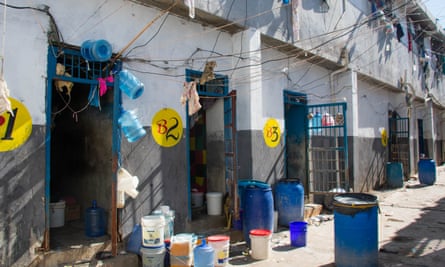
Display the image in full-screen mode.
According to reliable sources within the institution, a vast majority of prisoners are believed to have escaped. The prison, designed for a maximum capacity of 700 inmates, reportedly held 3,687 as of February last year, as stated by the human rights organization RNDDH.
According to a local journalist quoted by the BBC, the overwhelming majority of approximately 4,000 men detained there have managed to flee.
Some of the 18 former Colombian soldiers who were accused of being part of the group involved in the assassination of Haitian President Jovenel Moïse in July 2021 have decided to remain in the country. On Saturday evening, these Colombian individuals posted a video in which they begged for their safety.
One of the men, Francisco Uribe, pleaded for assistance in a widely circulated message on social media, saying, “Please, please help us. They are indiscriminately killing people in the cells.”
Another prison in Port-au-Prince, with around 1,400 prisoners, was also taken over.
Reports of gunshots were widespread in numerous neighborhoods on Saturday night, indicating a significant increase in violence.
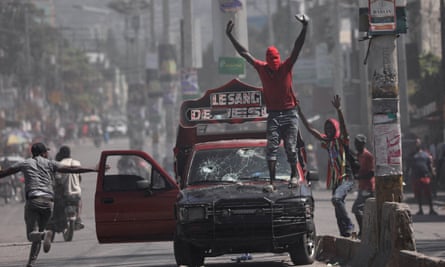
Display the image in full screen mode.
Residents in Haiti experienced a disruption in internet service due to damage to a fibre optic cable caused by the recent rampage. Fortunately, the connection was restored by field teams on Sunday afternoon.
Over the course of just under two weeks, various criminal groups have launched attacks on multiple state organizations. These groups are becoming more organized and have started targeting unexpected places, such as the central bank.
Following Moise’s death, Henry assumed the role of prime minister and has continuously delayed organizing parliamentary and presidential elections, resulting in over ten years without them taking place.
Last week, the prime minister, who is a neurosurgeon, signed agreements with Kenya’s president, William Ruto, in an attempt to save the plan of sending Kenyan police to Haiti.
The high court in Kenya declared the deployment unconstitutional in January, citing the absence of reciprocal agreements in the initial deal between the two nations. Despite calls for his resignation, Henry has ignored the demands and remained silent when questioned about the safety of returning home.
According to the UN, Haiti’s national police force consists of around 9,000 officers responsible for protecting over 11 million individuals. However, they often find themselves overpowered and outmanned by gangs, who are believed to hold control over up to 80% of the capital.
Following an outbreak of gunfire from gangs at Haiti’s international airport last week, the US embassy announced a suspension of all official travel to the country. On Sunday evening, it advised all American citizens to leave as promptly as possible.
The Biden government, which has provided financial aid and practical assistance to Haiti, has continued to reject the idea of deploying troops as part of a multinational force. It stated that it is closely observing the worsening security conditions with great alarm.
Stéphane Dujarric, a representative from the United Nations, stated that the recent increase in conflict highlights the urgency for member countries to promptly provide aid and send out the international security force.
He informed the media at the United Nations headquarters in New York that we have been discussing for several months the predicament of Haitian civilians and those in the city of Port-au-Prince, who are unable to escape the dangers caused by gang activity. Due to this unrest, schools have shut down, hospitals are unable to operate, and the populace endures daily hardships.
In the beginning of this year, the United Nations reported that over 300,000 individuals were forced to leave their residences because of the intensifying gang violence. This conflict resulted in nearly 5,000 deaths in the previous year.
.
This report was contributed to by the Associated Press and Reuters.
Source: theguardian.com



